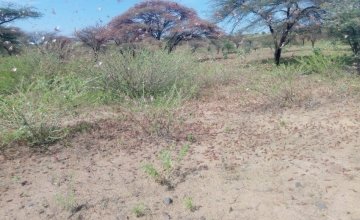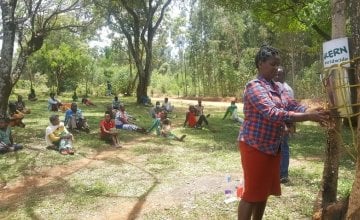
Read our 2023 annual report

Knowledge Hub
In Kenya and Ethiopia, the struggle to get adequate support during the COVID-19 emergency is posing a serious threat to people’s livelihoods, and even their lives.
Government restrictions across the region have, so far, kept the reported cases of this coronavirus down in both countries, with 36 and 5 deaths recorded by the World Health Organisation in Kenya and Ethiopia respectively as of Tuesday 12 May.
However, with limited access to testing and a massive shortage of personal protective equipment (PPE) in both countries, we may only be seeing the tip of the iceberg in terms of the damage being caused in East Africa by COVID-19.
The World Food Programme recently warned that as many as 265 million people worldwide could be pushed into acute food insecurity by the virus.
COVID-19 also stands to worsen existing crises across the world, and its impact will be most keenly felt in countries such as Kenya and Ethiopia, where a second wave of locust invasions this year is already threatening to bring mass hunger on a catastrophic scale.
Locusts continue to cause havoc
While Kenya’s arid and semi-arid lands (ASALs) had yet to report a single case of COVID-19 up to the middle of April, a second wave of a devastating locust infestation is destroying farmland crops and threatening to bring increased hunger and hardship to the region.
The first wave of the locust infestation struck earlier this year, with swarms measuring 60 kilometres by 40 kilometres devastating communities.
One small swarm measuring one square kilometre can eat the same amount of food in one day as 35,000 people. Not only can these swarms devour this season’s food, they can also consume the seeds for next season, endangering lives and livelihoods for months and even years.

Amina Abdulla is Concern’s Country Director in Kenya, and she explained how – as an organisation – we are doing everything we can to ensure that the threat of the locusts is not ignored in deference to the country’s COVID-19 response.
While the ASALs have no reported cases of the virus, restrictions on movement are country-wide and limiting the flow of information around the locust invasion.
We are currently advocating with the Kenyan government to ensure that the response to the infestation is not kept on the backburner.
“COVID has a significant impact at the moment, yes, but the damage that is being caused by the locusts is going to stay with us beyond COVID,” she says.
"People will lose their assets, they will lose the ability to support themselves now and even in the future, so we're trying to keep the pressure on the government to prioritise locust infestation control as well.”
With crops having been planted during the current rainy season, the fear is that damage will spread to other parts of the country if the situation in the ASALs is not managed.
“It's important for the government and other actors to ramp up efforts despite COVID-19. Already we have a population of about 1.3m that are chronically food insecure. With this, you could see the numbers tripling as a result of the damage caused by the locusts."
A desert invasion in Ethiopia
In Ethiopia, too, the locust infestation is leaving people afraid and uncertain.
"We're already in an existing complex humanitarian emergency, with eight million people in need of food,” says Eileen Morrow, Concern’s Country Director in Ethiopia.
“Now you've got a desert locust invasion, which looks like it's going to put another two million or three million in serious food insecurity. The number of locusts has tripled.
"This was a massive emergency in its own right even before COVID-19 came along. The locusts are arriving just in time for planting season so we're going to see crop activity really being impacted. It is very worrying."
Eileen adds that Irish Aid has provided funding to Concern for purchasing seeds in the worst affected areas, but a lot more needs to be done to prevent food shortages on a massive scale.

Staving off the threat of hunger
In both countries, aid agencies like Concern are doing everything they can to spread the word about best hygiene practices and social distancing, while doing their best to offset the damage done by both the swarms of locusts and those strict measures adopted to dampen the spread of COVID-19.
Eileen believes that the government’s priorities are torn between staving off the threat of hunger and ensuring the country’s limited medical facilities do not become overwhelmed.
"The government of Ethiopia is trying to take a pragmatic approach to all of this. In a lot of African and, indeed, Asian countries, people are one day's lack of employment away from starvation."
“If measures here are very strictly put in place, it will have a huge impact on families' wellbeing.”
This virus knows no borders
Eileen believes that there are already a significant number of cases in Ethiopia.
"It is a very fluid and fast-moving situation and, with a population in Ethiopia of 110m people, there is modelling that shows high levels of cases here,” she says.
Eileen feels that a joined-up, global effort is needed to fight the infection and that it is in the best interests of countries globally to help Africa to face down the worst of COVID-19, for fear of re-infections down the line.
This is something that Ethiopia’s Prime Minister, Abiy Ahmed, wrote about recently regarding a global response to the pandemic.
"The Prime Minister has written an article saying if the situation isn't resolved in Africa, it's going to have a huge impact on Europe because it will just keep re-infecting other countries,” says Eileen.
“It's really worrying and we need that support.
"I appreciate that there are huge global shortages but this virus knows no borders, it knows no skin colour, and it's going to devastate this country and others if it's not appropriately addressed.”

Kenya braces for impact
In Kenya, the government’s response will quickly be overwhelmed, should cases increase as expected in the coming weeks.
Dr Edwin Mbugua works for Concern as Health and Nutrition Coordinator in a country where crucial critical care equipment like ventilators are in drastically short supply.
He reveals how one group was given just $200 by the Kenyan government to improve on a prototype of a ventilator that could save hundreds, if not thousands, of lives; this inconsequential amount is proof of how the authorities’ hands are tied with the economy at a standstill.
As a result, private manufacturers of critical care and personal protective equipment are forced to rely on sporadic assistance from certain EU countries, the World Bank and private supporters.
It won’t be enough, says Edwin.
“As a result of the lockdown, we are starting to see parts of the population, particularly in informal settlements, having issues with food insecurity because of loss of income-generating opportunities, as well as the increased cost of food programmes,” he insists.
"If the cases increase, the government's capacity to respond is going to be overwhelmed.”
Please donate to Concern's COVID-19 response, and help us to fight food insecurity in the world's poorest countries during the pandemic.

Our impact in 2023
people reached through our emergency response
people reached through our health interventions
people reached through our livelihoods programmes

